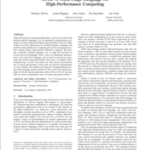A group of HPC thinkers, including the estimable Satoshi Matsuoka of the RIKEN Center for Computational Science in Japan, have come together to challenge common lines of thought they say have become, to varying degrees, accepted wisdom in HPC. In a paper entitled “Myths and Legends of High-Performance Computing” appearing this week on the Arvix […]
Terra: High-Performance Computing
High-performance computing applications, such as auto-tuners and domain-specific languages, rely on generative programming techniques to achieve high performance and portability. However, these systems are often implemented in multiple disparate languages and perform code generation in a separate process from program execution, making certain optimizations difficult to engineer. We leverage a popular scripting language, Lua, to stage the execution of a novel low-level language, Terra. Users can implement optimizations in the high-level language, and use built-in constructs to generate and execute high-performance code. To simplify meta- programming, Lua and Terra share the same lexical environment, but, to ensure performance, this code can execute independently of Lua’s runtime. We evaluate our design by reimplementing existing multi-language systems entirely in Terra. Our Terra-based auto- tuner for BLAS routines performs within 20% of ATLAS, and our DSL for stencil computations runs 2.3x faster than hand-written C.





